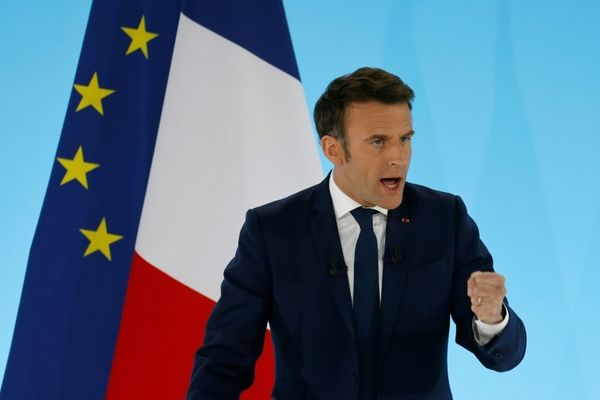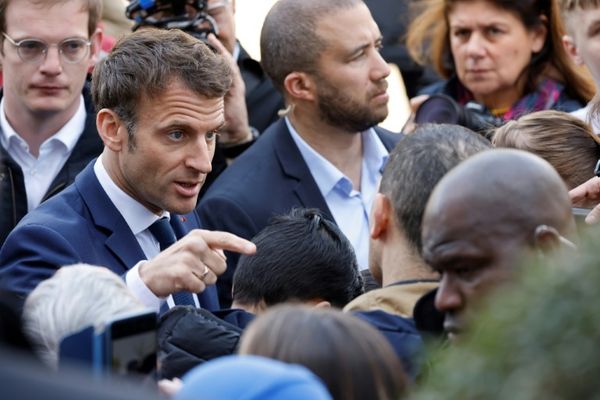
Paris (AFP) - French President Emmanuel Macron and far-right rival Marine Le Pen Monday embarked on a final fortnight of bruising campaigning for a French presidential election run-off whose outcome is far more uncertain than their encounter five years ago.
With 97 percent votes counted, Macron came in first in Sunday's first round of voting with 27.6 percent of the vote.Le Pen was second with 23.4 percent.
As the top two finishers, they advance to a second round on April 24.
Far-left candidate Jean-Luc Melenchon came close to beating Le Pen for the second spot, after a late surge gave him a score of just under 22 percent.
The duel between Macron and Le Pen is a re-run of the 2017 election final from which Macron emerged victorious with 66 percent.But this time polls predict a closer contest which will crucially hinge on voters who backed other candidates in the first round.
"Make no mistake: nothing is decided," Macron told cheering supporters at his campaign headquarters Sunday night.
Le Monde daily headlined: "Macron-Le Pen -- A more uncertain Act II."
'Really scary'
Macron said he would Monday be campaigning in northern France, while Le Pen is set to meet her campaign team before resuming her months-long grassroots efforts in small towns and rural France later in the week.
"A sad repetition," left-leaning daily Liberation called the Macron-Le Pen duel on Monday, adding: "This time it's really scary."
Polls gauging second-round voting intentions mostly point to around 53 percent for Macron and 47 percent for Le Pen.One poll, however, by the Ifop-Fiducial group suggested Macron could have only a razor-thin win with 51 percent versus 49 percent.
"The second round is the hardest one," said Finance Minister Bruno Le Maire on RTL radio.
"Everything begins again with a new campaign."
As well as campaigning on the merits of their respective programmes, both candidates will also scramble to woo voters of their defeated first-round rivals.
"We're going to have to win over the French people who didn't vote for Emmanuel Macron in the first round," government spokesman Gabriel Attal told the France Inter broadcaster on Monday.
"We're going to have to fight for this election."
'Not us'
In an early boost for the president, Communist Party candidate Fabien Roussel, Socialist Anne Hidalgo, Yannick Jadot of the Greens and right-wing Republicans candidate Valerie Pecresse said they would vote for him to prevent the far-right leader coming to power.
Without directly backing Macron, Melenchon in a crucial move also told his supporters not to give a "single vote" to Le Pen.
Meanwhile Le Pen's far-right rival Eric Zemmour, who garnered just over seven percent on Sunday, threw his weight behind her.
Le Pen, 53, said the run-off would present "a fundamental choice between two visions".
A pivotal moment in the next stage of the campaign will come on April 20 when the two candidates are set to take part in a TV debate broadcast live on national television.
Part of the battle will be to mobilise the 25 percent of registered voters who abstained in the first round.
The candidates from France's traditional parties of government -- the Socialists and the Republicans -- suffered humiliating defeats.
Sunday's vote spelled humiliation for Socialist Hidalgo, the mayor of Paris, who won only 1.7 percent, a historic low for the party which only a decade ago won the presidency.
The vote for the right-wing Republicans party, headed by nominee Valerie Pecresse, collapsed to 4.8 percent from 20 percent in 2017.
On Monday, Pecresse confessed her campaign finances, which included five million euros ($5.5 million) of her own money, were in a "critical" state, and called for donations from supporters.
'New method'
The election has been overshadowed by the war in Ukraine, with surging prices of everyday goods making the cost of living a key issue.
The vote could have major implications for the European Union, which Le Pen says she wants to radically reform.She has also said she wants to pull out of NATO's joint military command.
Macron countered Sunday that he did not want a France which "once out of Europe, would only have the international alliance of populists and xenophobes as allies.That's not us."
While her opponents accuse her of being divisive and racist, Le Pen has sought to project a more moderate image in this campaign and has focused on voters' daily worries over inflation.
But Macron is expected to target her past proximity with Russian leader Vladimir Putin, her policies on the EU, as well as the cost of her economic programme that includes massive tax cuts.
A win would give Macron, who came to power in 2017 aged 39 as France's youngest president, five more years to push through reforms that would include raising the pension age and cutting taxes for businesses.
He also floated the idea Sunday night of a "large movement of political unity and action" and a "new method" of governing, which could see him invite rival parties to formally join his political movement.
burs-jh/sjw/jv










